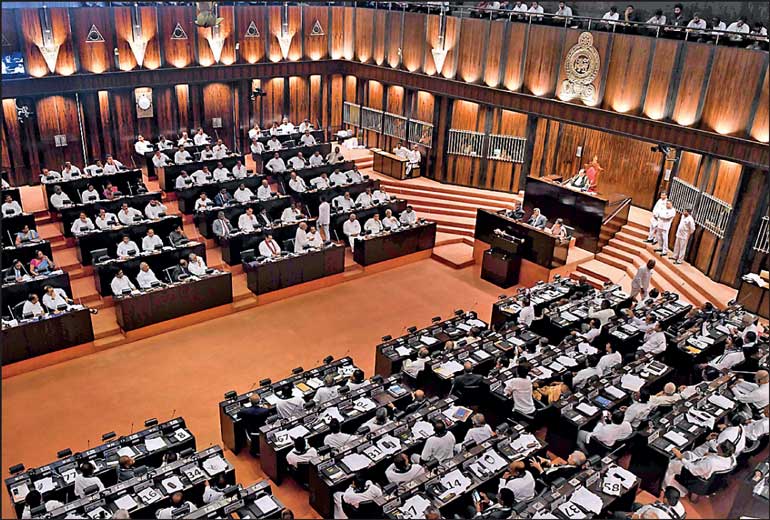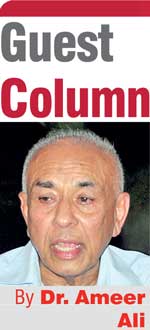Tuesday Feb 17, 2026
Tuesday Feb 17, 2026
Thursday, 19 May 2022 00:05 - - {{hitsCtrl.values.hits}}

In recent days we have seen the hopping behaviour of many among the 225 to jump side and rushing to rally behind the newly appointed and anointed non-elected Prime Minister Ranil Wickremesinghe (RW), (who has been bestowed with a new surname, Rajapaksa, for emerging as saviour of disgraced Rajapaksas).
(RW), (who has been bestowed with a new surname, Rajapaksa, for emerging as saviour of disgraced Rajapaksas).
RW and his retinue of supporters had advertised their new role as patriotic and to save the nation from its State-sponsored economic disaster. While outside the Parliament, Aragalaya is clamouring, with nationwide support and amidst numerous sacrifices, for a systemic change in political governance and the economy, inside the legislature these side-swayers are desperate to protect the status quo, because once the system is allowed to change there would be no hope for many of them to return to this assembly.
But will this interim government bring political stability? The man who is the primary cause for the economic ruin and on whom people have lost confidence is hiding behind the Constitution and continuing as an autocratic president. Aragalaya demands him to step down. At least a couple of party leaders in the Opposition had declared that they would not, on principle, join RW’s interim government as long as GR remains in that position. In the meantime, the ousted Prime Minister, who should have been arrested by now for his role in the recent violence, is under State protection at taxpayer expense.
Aragalaya also demands that all five Rajapaksas including the President be brought to trial and made accountable for their collective loot. According to one anonymous source, the total value of the Rajapaksa clan’s wealth amounts to a staggering Rs. 1,050,000,000,000,000. Even if 10% of it were to be proved true that amount is colossal. RW, having sanctimoniously declared support to Aragalaya is keeping silent on these core demands. In presenting the dire situation of the economy in a televised address he said, “My goal and dedication is not to save an individual, a family or a party. My objective is to save all the people of this country and the future of our younger generation.”
These are laudable sentiments. But the fact of the matter is he was chosen and appointed by an individual, anointed by his clan and supported by its party. Are we to believe that he will not be obliged to show gratitude to his promoters? Already in Parliament, TNA MP Sumanthiran exposed RW’s turncoat behaviour for not supporting the censure motion against the president to which the premier had promised support when in opposition. Thus, the current political stability is artificial and transitory. Moreover, whatever the stability inside the Parliament it does not translate into stability outside. As long as there is a “disconnect between Ranil’s premiership and sovereign people” political stability is not guaranteed. What about the economy? RW is an appointed premier without a mandate even from a constituency. Of course, he is experienced in the art of political craft and to his credit has earned some international recognition. With those assets and in the immediate term RW Government may be able to collect short-term economic and financial assistance from friendly countries mostly on credit basis, and from international donor institutions, to tie over some of the immediate difficulties facing the nation.
Negotiations with IMF could recommence as soon as a minister of finance is appointed, and IMF may extend cheaper and longer-term credit than others, and successfully restructure the country’s foreign debt also. But these alone are insufficient. The economy needs structural changes and the premier’s address did not touch at all on this important area. He is now floating the idea of privatising the loss-making SriLankan Airlines, which was unsuccessfully tried before. In fact, all State enterprises need radical reforms to increase their efficiency. There is also the problem of corruption and mafia power to be eradicated.
To restructure the economy and set it on a growth path requires serious re-thinking about and reformulation of the post-1977 open economy model and a U-turn from GR’s disastrous “alternate path”. It does not mean a total rejection of the open economy but reshaping it to give a Sri Lankan face, like how China embraced capitalism. Such restructuring is destined to disturb existing power relations in society and powerful vested interests would be up in arms against any fundamental change to the prevailing system. This is why restructuring requires a clear mandate from the people. It is highly unlikely whether the interim government with the kind of individuals supporting it and a premier whose educational background, political thinking and experience belong to the centre right would embark on such an adventure.
At least JVP and FSP seem to understand this necessity and they seem to build an understanding with the new and awakened generation that is spearheading the Aragalaya. This generation that accounts for nearly 60% of the voting public is educated, gender balanced, hetero-ethnic and is prepared to make the necessary sacrifices to build a new Sri Lanka. Theirs is the local expression of a global phenomenon. Without their mandate no party or government could dream of succeeding let alone surviving. The best that the RW government could do is to expedite the opportunity for that to happen. Let the monkeys go back to where they belong.
(The writer is attached to Murdoch Business School, Murdoch University, Western Australia.)